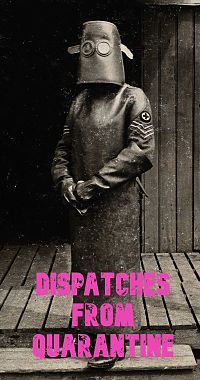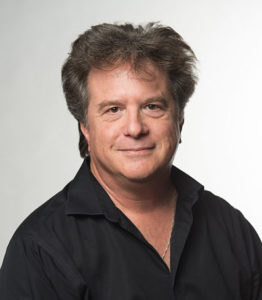 Toward the end of the 1946 film classic It’s A Wonderful Life, when George Bailey is in the throes of an existential crisis, fearing his life has no value or meaning, the angel Clarence tells him, “You’ve been given a great gift, George. A chance to see what the world would be like without you.”
Toward the end of the 1946 film classic It’s A Wonderful Life, when George Bailey is in the throes of an existential crisis, fearing his life has no value or meaning, the angel Clarence tells him, “You’ve been given a great gift, George. A chance to see what the world would be like without you.”
After two months under stay-at-home orders and my theatre temporarily closed, I’m beginning to feel the same gift has been given to me by COVID-19.
Every theatre in our nation is now dark. For now, theatre as an art form performed on a stage for a live audience, does not exist. And no matter which epidemiological model you look at, theatres won’t be reopening in this country any time soon. For those of us who create theatre, the coronavirus is giving the public the chance to see what the world would be like without us.
That is why, like George Bailey haunting his hometown, I now find myself thrown into the same kind of twilight zone, an alternative reality—an upside-down world I no longer recognize, discombobulated. How did things change so quickly? One day my theatre is full, earning rave reviews, selling out. The next day it is closed. On Thursday we’re winning awards, delighting donors and board members. On Friday I am furloughing my staff and applying for unemployment.
Do you know the actor’s nightmare? Ever had it? The one where you’re suddenly thrown onstage into a play in front of an audience, but you don’t know your lines, you can’t find your script, and you don’t even know what play you’re supposed to be doing? That is how life feels to me now: a COVID nightmare. But I never wake up.
If I don’t have a theatre, who am I? Sometimes the most forceful way to discover your place in a culture or a community is to find yourself suddenly yanked from it. All I know is that a world without live theatre is a world I don’t want to live in.
Clicking on a play reading on Zoom is no substitute. Maybe you feel differently, but I personally feel glutted with Zoom meetings and online theatre events by now. My idea of well used stay-at-home time is not watching another online festival of hastily written five-minute plays streamed by a struggling theatre company. Though novel at first, the relentless onslaught of online content by terrified theatres has spread as widely and aggressively as the virus itself. Don’t get me wrong: I love National Theatre Live. Who doesn’t? But who has the millions of dollars to produce and promote at that level? Call me old-fashioned, but I still find the difference between watching a play online vs. experiencing it live in a theatre like the difference between watching porn on your laptop and actually making love.
All the Broadway tributes now streaming online during this shutdown do prove one thing: Theatre people are well-suited to rise above an emergency. Disaster is part of our DNA. Crisis is status quo in the theatre. Calamity is business as usual. We live and breathe uncertainty and panic. Philip Henslowe, the beleaguered and always-in-debt theatre owner in Shakespeare in Love (screenplay written by playwright Tom Stoppard) aptly sums up our philosophy:
Henslowe: Mr. Fennyman, allow me to explain about the theatre business. The natural condition is one of insurmountable obstacles on the road to imminent disaster.
Fennyman: So, what do we do?
Henslowe: Nothing. Strangely enough, it all turns out well.
Fennyman: How?
Henslowe: I don’t know. It’s a mystery.
How will this horrific pandemic turn out well for me and my theatre? It would help to have a guardian angel. I don’t mean a corporate sponsor or a high-level donor—I mean like Clarence. My own personal celestial bodyguard to protect me from both spiritual and physical harm. Instead, I see only the Angel of Death. COVID-19 is killing people. Loss is everywhere. We are losing our jobs, our theatres, our audiences, our homes. Our loved ones. Our art form, not to mention our species, is under threat. There is a general, base-level sadness lurking inside all of us like a contagion. Laughter will come when it comes. But it just might be harder, and take a while longer, to get there.

We are all George Bailey. We have dreams unrealized. We are stressed by daily life. We don’t fully appreciate what we have or what we’ve managed to accomplish. We focus on what serves ourselves and ignore what really matters. We get caught up in achieving “great things” instead of appreciating the value of doing small things in a great way. And we are closer than we realize to a huge, catastrophic meltdown triggered by a single financial calamity.
But, as Clarence tells George, “Each man’s life touches so many other lives.”
Theatre is community, the intertwining of human lives. And community is infectious, transmitted from person to person. The ripple effect of the stories we tell in a theatre spreads from one human being to another, and then emanates outward, forever. That is why, to me, to have our theatres silenced by a virus, is like a crime against humanity. Our humanity.
My hope for myself is to emerge from this pandemic with a heightened sense of purpose. The great plays have shown me that a person with a strong central purpose can overcome any obstacle. To paraphrase Nietzsche, when you have a why to live for, you can bear any how. Theatre is one of my whys.
After two months holed up at home, I am starting to experience what the ancient Greeks called anagnorisis: a sudden realization of truth about myself and the true nature of my current situation. Before the pandemic, I would sometimes complain about running a theatre: the paperwork, the endless meetings, the donor parties. The season budgets and the hustling for money to pay for them. The long hours, the low pay, the constant pressure to achieve. After 30 years I felt old, overworked, exhausted. Now I want it all back. All I want now is what I had all along.
My wake-up call is the same as George Bailey’s epiphany, as he pleads to Clarence to end his never-been-born nightmare. Like George, I just want to return to the things and the work and the people I love. Like George, I just want what I already had. I miss the magic. The truth is that even when facing catastrophe, the life that I have in the theatre is wonderful.
Like George Bailey, I want to live again.
Stephen Sachs is a playwright, director, and the artistic director of the award-winning Fountain Theatre in Los Angeles.

